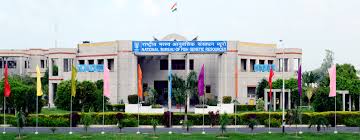NATIONAL BUREAU OF FISH GENETIC RESOURCES , LUCKNOW

Contact Information
| Contact Type | Details |
|---|---|
| Address | National Bureau of Fish Genetic Resources, Canal Ring Road, Post Box No. 1, Lucknow – 226002, Uttar Pradesh, India |
| Phone | +91-522-2451641, +91-522-2451642 |
| Fax | +91-522-2451641 |
The Indian Council of Agricultural Research (ICAR) oversees the prestigious National Bureau of Fish Genetic Resources (NBFGR), which can be found in Lucknow, Uttar Pradesh. NBFGR, which was established in 1983, is dedicated to the conservation of Indian fish genetic resources and their sustainable use. Through the study, documentation, and preservation of fish species, the bureau contributes significantly to the growth of aquaculture and the management of fisheries.
The National Bureau of Fish Genetic Resources (NBFGR) is located in Lucknow, Uttar Pradesh, India. It was founded in 1983. Its parent organization is the Indian Council of Agricultural Research (ICAR). Its primary focus areas are conservation, aquaculture, and fish genetic resources. to be a global leader in the management of fish genetic resources and to help India develop sustainable fisheries and aquaculture.
Mission: to preserve, characterize, and sustainably utilize fish genetic resources, as well as to encourage research and the transfer of technology for increasing fish production.
Core Research Areas NBFGR focuses on a number of important areas connected to resource conservation, aquaculture, and fish genetics.
1. Preservation of Fish Genetic Resources Preservation of native and endangered fish species in order to preserve biodiversity.
Cryopreservation of fish genetic material through the establishment of gene banks.
2. Hereditary Portrayal and Rearing
Research on the hereditary variety of fish species and improvement of rearing projects.
Utilization of molecular methods for marker-assisted selection and genetic mapping.
3. Aquaculture Development Through research and technology development, sustainable aquaculture practices are promoted.
studies of cultured fish species’ nutritional requirements and health management.
4. Management of Fisheries Study of sustainable methods for managing fisheries to guarantee the long-term viability of fish stocks.
Evaluation of fish populations and habitats in order to develop efficient conservation strategies.
5. Biotechnology in Fish Genetics The use of biotechnological tools to boost fish health and production.
Aquaculture-related research on genetically modified organisms (GMOs) and transgenic fish.
Fish Genetic Resources Department Description This department focuses on the preservation and documentation of fish genetic diversity.
Molecular biology studies molecular breeding and genetic characterization.
Aquaculture and Nutrition Research on the health, nutrition, and sustainability of aquaculture practices for fish.
The field of fish health management studies fish-related diseases and develops management strategies.
Fisheries Management and Economics focuses on the economic viability of fish resources and sustainable fisheries management.
Contributions and Major Projects National Fish Gene Bank: establishment of a cryopreservation-based gene bank for the preservation of indigenous fish species.
Programs for improving genetics: improvement of significant fish strains through selective breeding programs.
Development of Aquaculture Technology: Sustainable aquaculture methods for increasing fish production are the subject of research and dissemination.
Evaluation of Fishing Resources: comprehensive examinations of the state of fish populations and the conditions of their habitats across a variety of aquatic ecosystems.
Outreach and publication: contribution to outreach programs and scientific literature to educate people about fish conservation and sustainable practices.
Infrastructure and Facilities NBFGR has a variety of facilities to support its conservation and research efforts.
Fish Gene Bank is a cryopreservation facility for the purpose of preserving fish genetic resources.
The most advanced laboratory for genetic analysis, including DNA sequencing and genetic mapping, is the Molecular Biology Lab.
Aquaculture Research Station A facility for studying fish health management and aquaculture practices.
A center for fisheries management research and policymaking is the Fisheries Management Office.
The Training and Education Center provides workshops and training programs for aquaculture and fisheries stakeholders.
Academic Programs and Training NBFGR provides a number of educational and training opportunities with the goal of increasing capacity in aquaculture and fish genetics.
The Ph.D. program offers doctoral research opportunities in aquaculture and fish genetics.
Postdoctoral Fellowships: Positions in advanced research for Ph.D. graduates.
Workshops and training sessions on fish genetics, aquaculture methods, and management strategies are included in training programs.
Partnerships for collaborative research with universities and other research establishments for joint projects and studies
Partnerships and Collaborations NBFGR collaborates with a number of organizations to boost aquaculture and fish genetics research and conservation efforts. Some notable collaborations include:
For global collaboration in fish breeding and genetics, the International Network for Genetic Evaluation of Aquaculture (INGEAC) was established.
WorldFish for promoting environmentally friendly aquaculture methods in developing nations.
Indian research institutes and universities for knowledge exchange and collaborative research.
Partnerships with the private sector for the transfer of technology and the commercialization of research results.
Outreach and Public Participation NBFGR actively promotes fish conservation and sustainable practices through outreach activities.
Seminars and Workshops: Events on a regular basis to inform stakeholders about sustainable aquaculture and genetic resources for fish.
Public Education Initiatives: initiatives to raise awareness of the significance of biodiversity and fish conservation.
Programs for Schools and Colleges: involving students in fish biology and aquaculture-related educational tours, lectures, and hands-on activities.
Address National Bureau of Fish Genetic Resources, Canal Ring Road, Post Box No. Contact Information Contact Type Details 1, Lucknow – 226002, Uttar Pradesh, India
Phone +91-522-2451641, +91-522-2451642
Fax +91-522-2451641
Future Bearings
NBFGR plans to extend its exploration and preservation endeavors in the accompanying regions:
Developing New Species Through Genetics: The study of how to improve the genetics of underutilized fish species for aquaculture.
Aquaculture’s Climate Adaptability: developing strategies for adapting aquaculture to the effects of climate change.
Enhancing Conservation Initiatives: enhancing efforts to protect endangered fish species and their habitats.
Public-Private Partnerships: collaborating with stakeholders in the industry to make it easier to transfer technology and implement sustainable practices in aquaculture and fisheries.
Courses/Programs
| Serial# | Title | Estimated Cost | Program type |
|---|
